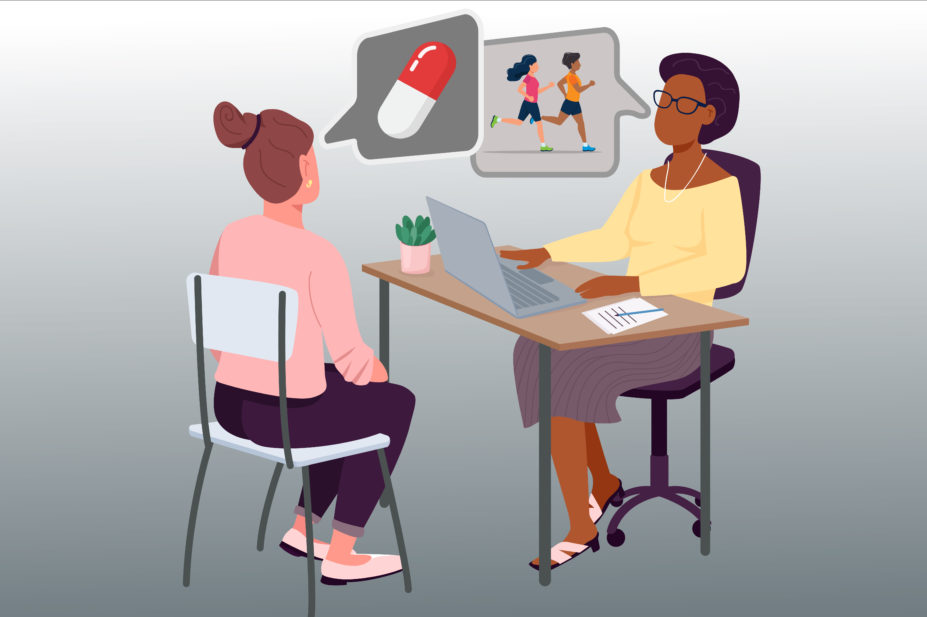
Shutterstock.com
According to the Personalised Care Institute, 40% of people do not feel included in decisions about their health and care. This prompts the question: what is true inclusion? And how can we ensure that we are enabling effective shared decision making?
Our historical, well-intentioned practice of ‘manoeuvring’ patients into making the choice that we think is the best for them is not shared decision making. It only perpetuates the issue of non-compliance because their treatment does not often fit with their priorities, wants or needs.
A frustration with this scenario led to a ‘call to action’ for the authors of this article. We need to pave a different way forward that allows people to take more agency in their healthcare. We have heard too many stories of unmet needs, such as the case of Andrew Taylor. For more than a decade, Taylor’s concerns were dismissed by many different healthcare professionals and he was pushed into long-term steroid use, despite his reservations. This had severe consequences and an adverse effect on his physical and mental health.
Pharmacists are highly competent at providing information about medicines. However, ‘telling’ people how to take their medicines and ‘giving’ them information isn’t enough. We need to enable choice, control and agency by involving people in decisions. Person-centred conversations require us to be less checklist-orientated, so we can listen, understand people’s experiences and support them to develop practical and realistic solutions. Shared decision making is rooted in the ethical principles underpinning clinical practice and is included in the NHS constitution — there is a clear need for upskilling communication skills to enable this.
The focus has shifted from ‘what’s the matter with you?’ to ‘what matters to you?’
The dynamic between healthcare professionals and patients is slowly moving away from the paternalistic model that has been in place for many years, where clinicians are trained to identify as ‘experts’ with a role to ‘fix’ people. The focus has shifted from “what’s the matter with you?” to “what matters to you?”. This shift in approach may be challenging for some staff and may require additional training and support to embed.
To help meet this need, Leeds Teaching Hospitals partnered with a project called ‘Better Conversations’ to support the hospital pharmacy team to deliver personalised care through high-quality conversations. The focus was on helping staff navigate challenging conversations and empower patients to take ownership of their medicines management. Support was offered through interactive online workshops, with theory and practical strategies to implement, alongside regular post-workshop peer discussions.
Staff feedback shows how this work has transformed their practice, and they are seeing the benefits of conversations that are more open and directed by the patient and their individual needs.
Allowing people to express their worries, and offering empathy without judging people for their choices, builds trust. As a result, patients engage more and this leads to a more positive experience for everyone. Clinicians report a positive experience with supporting people to find and test their own solutions, rather than holding all the responsibility of trying to fix people, which can lead to frustration if it doesn’t work. Patients tend to ask more questions when they feel valued and this in turn makes clinicians feel valued too, building a reciprocal relationship.
Changing the culture of conversations in healthcare is not easy. Moving away from the usual templates and checklists leaves us feeling vulnerable and full of ‘what if’s’ about the things we might not have got around to explaining. But as much as pharmacists are trained to be experts in population-based effects of medicines, we do not live the lives of our patients. We don’t know what it actually feels like to be taking that medicine, or how it may interfere with daily living. We probably don’t realise just how many decisions about that medicine the patient is making each day: how they are going to fit it in around mealtimes, work or school or where they are going to get more supplies from.
On top of that are the patient’s beliefs about their medicines, and their own motivations to engage (or not) with treatment. By seeking to understand these factors and have “better conversations”, we stand a much greater chance of opening a door that will lead to better care.
Box: Practical strategies to support conversations around medicines
- Start the conversation by building a picture about the person and their medicines. Uncover what is important to them — for example, their motivations and priorities. This can be done through curious and open questioning;
- It is helpful to assess people’s baseline knowledge and beliefs about their medicines, as this gives you an insight into their understanding, helping you identify gaps and opportunities to tailor the conversation to meet their individual needs;
- People should feel comfortable being honest with a pharmacist; to do that, we need to create a safe, non-judgemental environment;
- Allow people the opportunity to express their worries or concerns early in the conversation so that these can be acknowledged and addressed.
Declaration: The authors have not declared any conflicts of interest


